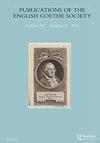The German Beast Unleashed: Kleist’s Hermannsschlacht and the Suspension of 'Human Rights' in the Era of Nationalism
IF 0.1
3区 文学
0 LITERATURE, GERMAN, DUTCH, SCANDINAVIAN
引用次数: 0
Abstract
Abstract This article scrutinises the aporetic confrontation of different ultimate values in Kleist’s infamous Die Hermannsschlacht, namely nationalism and a basic notion of ‘human rights’. Kleist’s play does not settle for one of these priorities, but conceptualizes the nation as a facilitator, promulgator, and protector of rights and — at the very same time — as an inexorable principle of selection which ties the notions of exclusion and elimination closely to those of inclusion and participation. In this respect, Die Hermannsschlacht not only prepares and anticipates elements of Carl Schmitt’s political theory, but also comes very close to Giorgio Agamben’s analysis of sovereignty and the production of politically qualified life in his Homo Sacer series. However, it does so without completely abandoning the universal ideas of human rights.德国野兽的释放:克莱斯特的赫尔曼斯施拉赫特与民族主义时代“人权”的中止
摘要本文考察了克莱斯特臭名昭著的《Hermannsschlacht》中不同终极价值,即民族主义与“人权”基本概念的辩证对立。克莱斯特的戏剧并没有满足于这些优先事项之一,而是将国家概念化为权利的促进者、传播者和保护者,同时,作为一种无情的选择原则,将排斥和消除的概念与包容和参与的概念紧密联系在一起。在这方面,《Hermannsschlacht》不仅准备和预测了卡尔·施密特(Carl Schmitt)政治理论的要素,而且非常接近乔治·阿甘本(Giorgio Agamben)在他的Homo Sacer系列中对主权和政治上合格的生活的生产的分析。然而,它这样做并没有完全放弃人权的普遍观念。
本文章由计算机程序翻译,如有差异,请以英文原文为准。
求助全文
约1分钟内获得全文
求助全文
来源期刊

Publications of the English Goethe Society
LITERATURE, GERMAN, DUTCH, SCANDINAVIAN-
CiteScore
0.10
自引率
0.00%
发文量
15
 求助内容:
求助内容: 应助结果提醒方式:
应助结果提醒方式:


